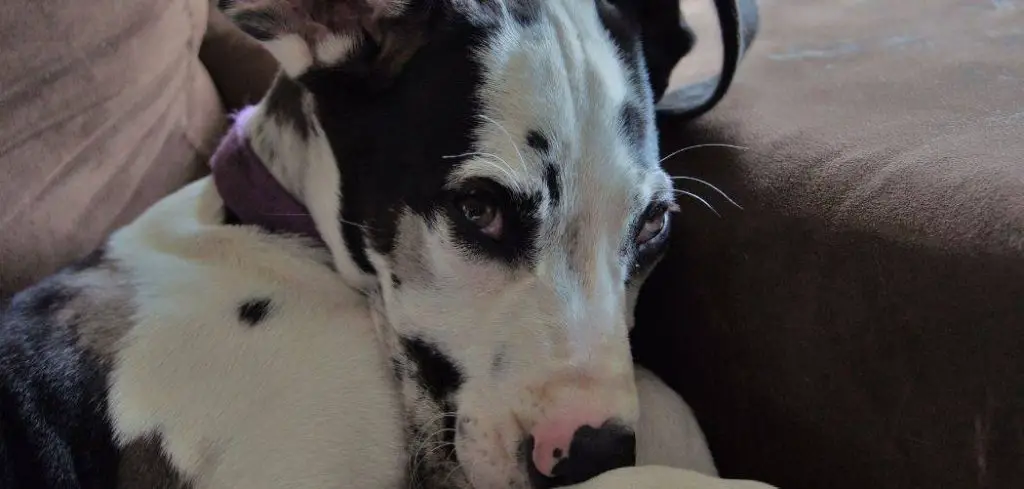Dog panting combined with frequent biting of the feet can be alarming for any dog owner. These behaviors often indicate that something is bothering your dog, whether physically, mentally, or emotionally.
Observing these signs early and understanding how to respond can help ensure your dog stays comfortable and healthy.
We outline the common causes of a dog panting and biting its feet, what you can do at home, and when to seek veterinary help.
Dog Panting and Biting Feet — Why It Happens
When a dog is both panting and biting at their feet, these symptoms may be linked to discomfort, stress, allergies, or even pain.
Panting often signals overheating, anxiety, or physical exertion, while foot chewing could point to skin irritation, parasites, or behavioral issues.
Together, they may indicate a single underlying condition or two separate problems that need addressing.

Dog Panting and Biting Feet: Common Causes
Allergies
Allergies are one of the most common reasons dogs chew at their feet. Food sensitivities, environmental allergens like pollen, or contact irritants such as lawn chemicals can inflame the skin between the toes.
Panting may occur alongside allergic reactions if your dog is feeling itchy, anxious, or uncomfortable. In severe cases, allergies can cause restlessness, leading to heavier breathing.
Because untreated allergies often worsen over time, veterinary evaluation is essential to prevent secondary infections.
Read more: Dog Panting and Biting Tail (Here’s why)
Parasites
Fleas, mites, and ticks can cause intense itching, especially around the paws. Your dog may bite and chew at their feet to try to relieve the discomfort.
Panting could be a result of the irritation, pain, or anxiety caused by the infestation. Some parasites, like sarcoptic mange mites, can spread quickly and cause significant skin damage.
A vet can confirm the presence of parasites and recommend effective treatment to protect both your pet and other animals.
Pain or Injury
If a dog has a cut, thorn, or splinter in their paw, biting at the foot is a natural response to discomfort. They may pant more if the pain is significant or if walking is difficult.
Orthopedic pain, such as arthritis, can also lead to licking or biting the paws due to referred discomfort. Panting may increase as a general sign of distress or to cope with chronic pain.
Addressing pain quickly prevents worsening injury and helps your dog return to comfort faster.
Anxiety and Stress
Anxious dogs often exhibit repetitive behaviors like foot chewing. Separation anxiety, noise phobias, or new environmental changes can trigger both panting and self-grooming.
Panting is one of the clearest physical signs of canine stress. If your dog is panting heavily indoors without heat exposure and biting at their feet, emotional distress could be the root cause.
Behavioral support and calming strategies can make a significant difference in these cases.
Heat and Overexertion
If your dog has been active or is in a warm environment, panting is their way of cooling down. But biting at their feet in this context could signal irritation from hot pavement, grass seeds, or insect bites encountered during exercise.
Overheating can quickly become dangerous, especially in brachycephalic (short-nosed) breeds. If panting persists and your dog continues to fuss over their paws, seek shade and hydration immediately.
What to Do If Your Dog Is Panting and Biting Feet
Start by checking your dog’s paws for obvious issues like cuts, swelling, foreign objects, or ticks. Gently clean the area if you find debris or dirt.
If no injury is visible, consider whether environmental or food allergies could be causing irritation. Reviewing recent diet changes or exposure to new environments may help identify the trigger.
Provide a calm, cool environment and fresh water to rule out heat-related panting. If stress seems likely, offer reassurance and reduce exposure to potential triggers.
For mild cases, soothing paw balms or protective booties can help, but persistent or worsening symptoms should always be evaluated by a veterinarian.
When to Call or Visit Your Vet
Seek veterinary care immediately if your dog’s panting is excessive, labored, or accompanied by collapse, pale gums, or lethargy.
Contact your vet if foot chewing leads to open sores, swelling, or bleeding, or if the behavior is interfering with normal activities.
Ongoing panting without heat exposure, combined with constant paw biting, can signal underlying pain, infection, or systemic illness requiring professional diagnosis.
Read more: Dog panting excessively (Here’s why)
Key Takeaway
Panting and biting at the feet in dogs should not be ignored, especially when both occur together. While some causes are minor and easily treated, others may indicate more serious health or behavioral issues.
By monitoring symptoms closely, checking paws regularly, and involving your vet early, you can help your dog get the relief they need and prevent long-term discomfort.
